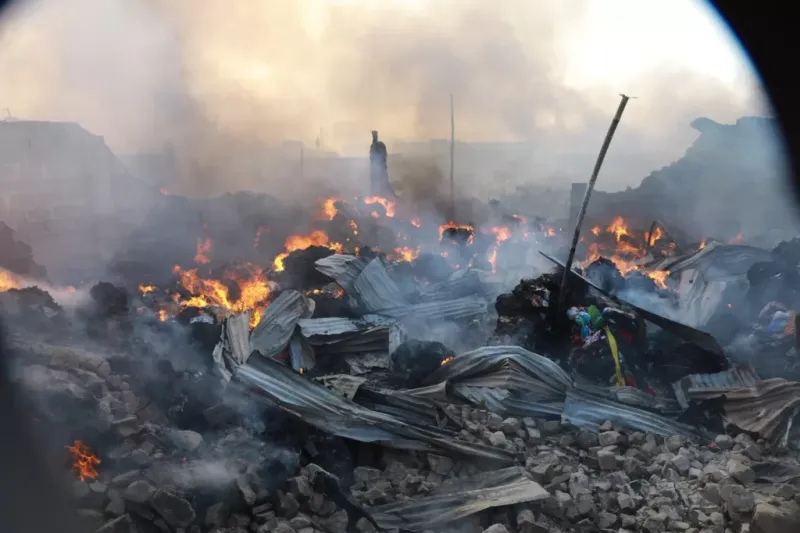Accra’s Kantamanto Market, one of Ghana’s busiest trading hubs, was devastated by a massive fire in the early hours of Thursday morning. The inferno, which left rows of shops reduced to ashes, destroyed goods worth millions of cedis and displaced countless traders.
Eyewitness footage, captured from above, revealed the shocking extent of the destruction, with thick plumes of smoke rising from the heart of the market as firefighters and local volunteers struggled to contain the flames.
A History of Fires at Kantamanto Market
This latest tragedy is not an isolated event but part of a troubling pattern for Kantamanto Market. Over the years, the market has been plagued by repeated fire outbreaks, including significant incidents in:
- December 2012: A fire destroyed a large section of the market, leaving hundreds of traders without livelihoods during the holiday season.
- April 2019: Another inferno engulfed portions of the market, destroying over 2,000 stalls.
- November 2020: One of the most devastating fires on record caused extensive damage, prompting calls for improved safety measures.
Despite these recurring incidents, concerns remain over the lack of comprehensive fire prevention strategies and emergency preparedness at the market.

Broad Concerns and Public Perceptions
For many Ghanaians, the repeated fires at Kantamanto Market are emblematic of broader systemic issues:
- Fire Safety and Infrastructure
Traders have long raised concerns about the poor electrical wiring, overcrowding, and flammable materials that make the market a high-risk area. Calls for government intervention to improve infrastructure and enforce safety regulations have often gone unheeded. - Preparedness of the Ghana National Fire Service (GNFS)
The GNFS has faced criticism for its response to market fires, with accusations of delayed arrivals and inadequate resources. In the aftermath of the 2020 fire, the GNFS pledged reforms, yet this latest incident raises questions about the effectiveness of those efforts. - Economic Hardship
With traders losing their merchandise repeatedly, the fires deepen economic struggles for those who rely on the market for their livelihoods. Insurance coverage for traders remains limited, leaving many without a safety net after such disasters. - Public Distrust
Speculations about the causes of these fires, including sabotage and negligence, have fueled mistrust between traders and authorities. Many traders believe more robust investigations are needed to identify and address root causes.
Authorities Respond to Latest Fire
Emergency services continue to assess the extent of the damage, while the government has pledged to provide support to the affected traders. Speaking on the incident, a representative from the Ghana National Fire Service noted:
“We are working tirelessly to determine the cause of the fire and ensure affected traders receive the necessary assistance.”
However, traders have expressed frustration at the slow pace of rebuilding efforts after past incidents, with some questioning whether meaningful support will materialize.
The Way Forward
As Kantamanto Market faces yet another recovery process, urgent reforms are needed to prevent future tragedies. Key steps include:
- Comprehensive Safety Audits: Regular inspections to address electrical hazards and structural vulnerabilities.
- Emergency Response Improvements: Investing in modern firefighting equipment and training for quicker, more effective responses.
- Trader Education: Providing training on fire safety and the importance of securing insurance for goods.
- Accountability and Transparency: Conducting thorough investigations into the causes of fires and publishing findings to restore trust.
Conclusion
The fire at Kantamanto Market is a stark reminder of the vulnerabilities faced by Ghana’s informal trading sector. Beyond immediate relief efforts, long-term solutions are essential to safeguard livelihoods and protect one of the nation’s most vital economic hubs.





















